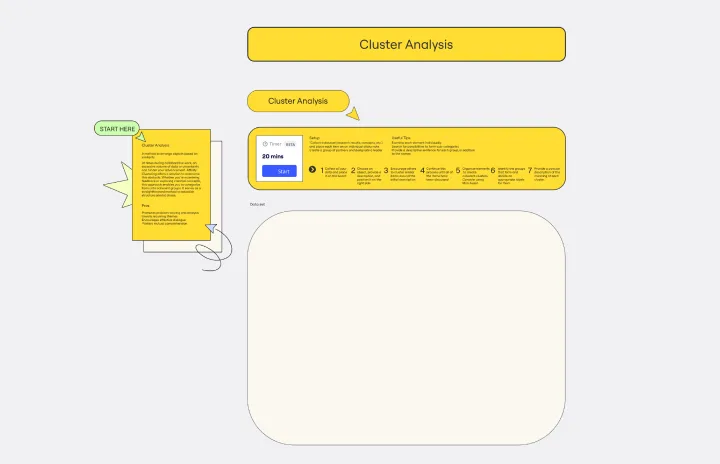What is PESTLE analysis?
A PESTLE analysis is a strategic business tool that allows organizations to understand how various elements might impact their businesses now and in the future. PESTLE stands for the six main external factors that can influence a business: Political factors, Economic factors, Social factors, Technological factors, Legal factors, and Environmental factors. Each of these concepts is an external factor that could represent opportunities and threats to your organization.
When should you do a PESTLE Analysis?
Organizations use PESTLE analyses to discover, evaluate, organize, and track the macroeconomic factors underlying business outcomes. PESTLE analyses are useful because they help inform strategic planning, budget allocation, and market research.
You can do a PESTLE Analysis any time you’d like to strategically assess where you are and what you’re likely to experience in the future. This exercise is especially useful when planning marketing, organizational change, business and product development, and research.
What are the 6 factors of a PESTLE analysis?
We explore each of the main factors in a PESTLE analysis in a bit more depth below.
1. Political
Many organizations are impacted by political or politically-motivated factors. For example, government policy, political instability, corruption, foreign trade policy and trade restrictions, labor laws, environmental laws, or copyright laws might all affect a company’s strategic planning. When evaluating the political aspect of a PESTLE analysis, you should ask: What governments, government policies, political elements, or groups could benefit or disrupt our success?
2. Economic
For businesses, economic factors can prove beneficial or detrimental to success. For example, industry growth, seasonal changes, labor costs, economic trends, growth rates, exchange rates, interest rates, unemployment rates, consumers’ disposable income, taxation, and inflation each carry a sizable potential impact on the business. When evaluating the economic aspect of a PESTLE analysis, you should ask: What economic factors might impact our company’s pricing, revenue, and costs?
3. Social
Social attitudes, trends, and behaviors might influence your business, customers, and market. For instance, attitudes and beliefs about money, customer service, work, and leisure, and trends in lifestyles, population growth, demographics, family size, and immigration can heavily impact a business. When evaluating the social aspect of a PESTLE analysis, you should ask: How do our customers’ and potential customers’ demographic trends and values influence their buying habits?
4. Technological
Technology can affect your organization’s ability to build, market, and ship products and services. For example, legislation around technology, consumer access to technology, research and development, and technology and communications infrastructure impact most businesses and organization. When evaluating the technological aspect of a PESTLE analysis, you should ask: How might existing or future technology impact our growth and success?
5. Legal
Myriad legal factors can affect your organization’s ability to operate. For example, consumer laws, labor laws, and safety standards might impact the organization. When evaluating the legal aspect of a PESTLE analysis, you should ask: How might existing or future legal frameworks impact our organization’s ability to operate?
6. Environmental
Certain industries, such as tourism, agriculture, and farming, are sensitive to environmental changes. For instance, climate change, weather, and geographic location might influence a company’s business decisions. When evaluating the environmental aspect of a PESTLE analysis, you should ask: How might environmental changes help or hinder our company’s ability to operate?
How do you run a PESTLE analysis?
Step 1: Brainstorm the various PESTLE factors
Consider the six factors listed above that might impact your business: political, economic, social, technological, legal, and environmental. You can hold a large brainstorming session or invite your teammates to brainstorm themselves and come prepared with ideas. Your goal should be to list specific ways that these factors can influence your business, and how you might deal with them.
Step 2: Rank these factors
Based on their expected level of impact on the organization, rank the factors that you listed above. If there are significant discrepancies in ratings, discuss those! Allow people the time and space to change their mind. Adjust the ranking as your teammates provide more input.
Step 3: Share your analysis
With your PESTLE analysis complete, it’s time to share your completed analysis with stakeholders. A critical part of the PESTLE analysis is keeping stakeholders informed of what you’re doing about external factors that can influence your business.
Step 4: Repeat
Finally, you should repeat the PESTLE analysis to keep your strategies and processes up to date. This will ensure you stay knowledgeable and informed about the various important factors you need to keep in mind when strategizing for your business.
PESTLE Analysis Template FAQs
What does PESTLE stand for?
PESTLE stands for Political, Economic, Social, Technological, Legal, and Environmental. Each of these concepts is an external factor that could represent opportunities and threats to your organization now and in the future.
When should you do a PESTLE Analysis?
You can do a PESTLE Analysis any time you’d like to strategically assess where you are and what you’re likely to experience in the future. This exercise is especially useful when planning marketing, organizational change, business and product development, and research.

Miro
Your virtual workspace for innovation
Miro is an innovation workspace designed for teams of every size, everywhere, to dream, design, and build the future together. Our mission? To empower these teams to create the next big thing, powered by AI at every step of the way. Over 90 million users around the world rely on Miro to untangle complex ideas, put customer needs first, and deliver products and services faster. All supported by best-in-class security, compliance, and scalability.
Categories
Similar templates
4C Analysis Template

4C Analysis Template
The 4C Analysis Template is a valuable tool for any business looking to gain a better understanding of their organization. Whether you are a small business owner or a large corporation, the template can help you identify areas for growth and develop more effective strategies.
3C Analysis Template

3C Analysis Template
The 3C Analysis Template is a powerful tool that can help you analyze your business environment, identify opportunities for growth, and guide your business strategy. By using the template, you can collaborate with your team in real time, customize the template to fit your needs, and save time, making it an essential tool for any business looking to stay ahead of the competition.
Cluster Analysis Template

Cluster Analysis Template
When you're working with others, you might encounter situations where there's too much information to handle, or you're unsure about the direction to take. In such cases, using the Cluster Analysis Template can be helpful. It allows you to group similar items together and make sense of them, whether feedback or creative ideas. This method is straightforward and provides clarity amidst confusion.
Cost-Benefit Analysis Template

Cost-Benefit Analysis Template
With so many day-to-day decisions to make—and each one feeling high-stakes—it’s easy for all the choices to weigh a business or organization down. You need a systematic way to analyze the risks and rewards. A cost benefit analysis gives you the clarity you need to make smart decisions. This template will let you conduct a CBA to help your team assess the pros and cons of new projects or business proposals—and ultimately help your company preserve your precious time, money, and social capital.
4C Analysis Template

4C Analysis Template
The 4C Analysis Template is a valuable tool for any business looking to gain a better understanding of their organization. Whether you are a small business owner or a large corporation, the template can help you identify areas for growth and develop more effective strategies.
3C Analysis Template

3C Analysis Template
The 3C Analysis Template is a powerful tool that can help you analyze your business environment, identify opportunities for growth, and guide your business strategy. By using the template, you can collaborate with your team in real time, customize the template to fit your needs, and save time, making it an essential tool for any business looking to stay ahead of the competition.
Cluster Analysis Template

Cluster Analysis Template
When you're working with others, you might encounter situations where there's too much information to handle, or you're unsure about the direction to take. In such cases, using the Cluster Analysis Template can be helpful. It allows you to group similar items together and make sense of them, whether feedback or creative ideas. This method is straightforward and provides clarity amidst confusion.
Cost-Benefit Analysis Template

Cost-Benefit Analysis Template
With so many day-to-day decisions to make—and each one feeling high-stakes—it’s easy for all the choices to weigh a business or organization down. You need a systematic way to analyze the risks and rewards. A cost benefit analysis gives you the clarity you need to make smart decisions. This template will let you conduct a CBA to help your team assess the pros and cons of new projects or business proposals—and ultimately help your company preserve your precious time, money, and social capital.